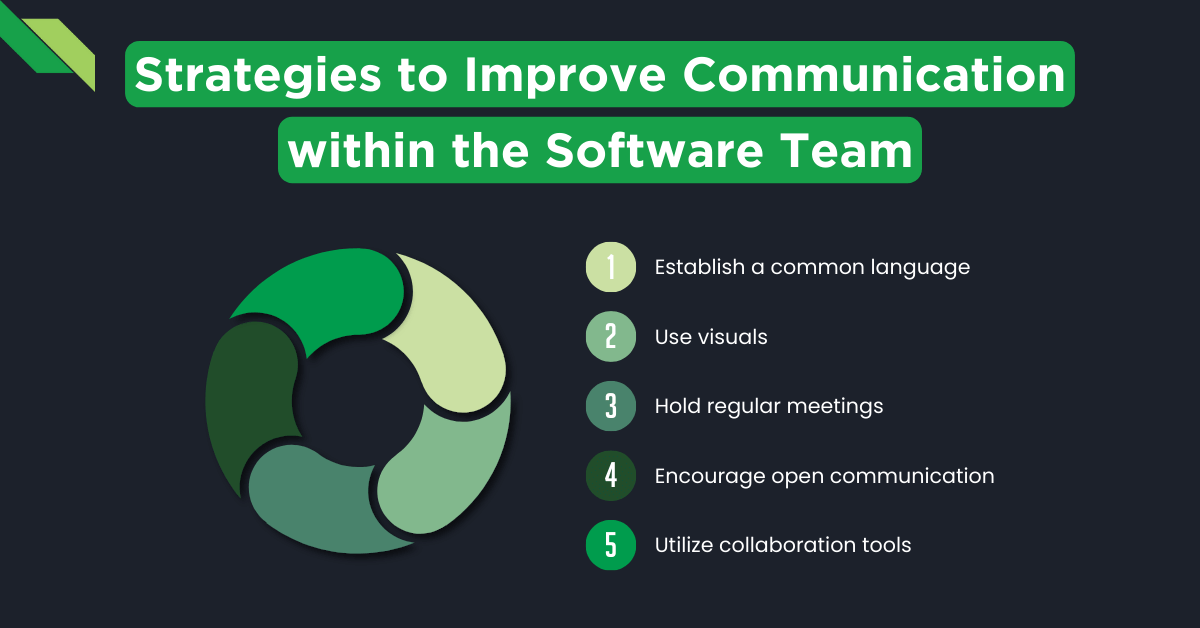Last Updated on 2025-05-19
You’ve assembled a team of talented developers and non-technical stakeholders.
But as the project progresses, you find yourself grappling with a familiar challenge—the seemingly insurmountable communication gap between those who speak in code and those who speak in business terms.
Sound familiar? You’re not alone.
Effective communication in software development is the key to success. When developers and non-technical stakeholders work together seamlessly, projects are completed on time, within budget, and to the satisfaction of all parties involved.
However, bridging the gap between technical jargon and business requirements can be daunting.
In this article, we’ll explore the challenges of communication in software development and provide strategies to help developers and non-technical stakeholders collaborate more effectively.
Challenges in Communication in a Software Development Team
One of the most significant challenges is explaining technical concepts to non-technical stakeholders.
Developers must be able to break down complex ideas into simple, easy-to-understand language.
This requires patience, empathy, and the ability to put oneself in the shoes of someone who may not have a technical background.
Below are the common challenges that hinder effective communication in software development:
- Technical jargon: Developers often use complex technical terms that non-technical stakeholders may not understand, leading to confusion and miscommunication.
- Different priorities: Developers may focus on the technical aspects of the project, while non-technical stakeholders prioritize business goals and user experience.
- Time constraints: Tight deadlines can pressure the team, causing stress and reducing the time available for effective communication.
- Remote work: With the rise of remote work, teams may face additional communication challenges. This includes difficulty scheduling meetings across time zones and the lack of face-to-face interactions.
Strategies to Improve Communication within the Software Team
Adopting various well-established communication strategies makes effective communication in software development teams possible.

- Establish a common language: Create a glossary of terms developers and non-technical stakeholders can refer to, ensuring everyone is on the same page.
- Use visuals: Diagrams, flowcharts, and wireframes can help convey complex ideas more effectively than words alone.
- Hold regular meetings: Schedule stand-up meetings, sprint reviews, and retrospectives to keep everyone informed and aligned on project goals.
- Encourage open communication: Foster a culture of transparency and encourage team members to ask questions, share ideas, and provide feedback.
- Utilize collaboration tools: Leverage collaboration tools like Slack, Jira, and Trello to streamline communication and keep everyone updated on project progress.
How to Overcome Resistance to Change
Implementing new communication strategies can be met with resistance, especially if the team is used to working in a certain way.
To overcome this, it’s essential to:
- Communicate the benefits: Clearly explain how improved communication will lead to better project outcomes and a more positive work environment.
- Involve the team: Encourage team members to provide input and feedback on the proposed changes, giving them a sense of ownership in the process.
- Start small: Introduce changes gradually, allowing the team to adapt and adjust over time.
- Celebrate successes: Recognize and reward team members who embrace the new communication strategies, reinforcing positive behavior.
Why Effective Communication in Software Development is Crucial
Communication is a basic necessity for every organization. It is especially vital in a software team where technical members must collaborate with non-technical members and vice versa.
Regardless of the number of people on your team, how they exchange information can make or break a software project.
Below are some of the biggest ways that communication can impact your software development project:
- Alignment: Effective communication ensures that everyone is working towards the same goals, reducing the risk of misunderstandings and wasted effort.
- Efficiency: When team members communicate well, they can quickly identify and resolve issues, leading to faster project completion and higher-quality results.
- Innovation: Open communication fosters collaboration and idea-sharing, leading to more innovative solutions and better problem-solving.
- Client satisfaction: Clear communication with clients helps manage expectations, meets their needs, and leads to higher satisfaction levels and repeat business.
Full Scale for Your Software Development
Effective communication is the foundation of successful software development. By implementing strategies to bridge the gap between developers and non-technical stakeholders, teams can work more efficiently, innovate more effectively, and deliver better results.
At Full Scale, we understand the importance of effective communication in software development. Our experienced developers and project managers are masters at bridging the gap between technical and non-technical stakeholders.
When you partner with Full Scale, you can expect:
- Clear, consistent communication: We explain technical concepts in simple, easy-to-understand terms, ensuring everyone is on the same page.
- Proactive updates: Our team regularly updates you on project progress, keeping you informed every step of the way.
- Collaborative approach: We work closely with your team to understand your business goals and develop solutions that meet your unique needs.
- Proven track record: With years of experience in software development, we have a proven track record of delivering high-quality projects on time and within budget.
We’re committed to fostering clear, open communication and helping our clients achieve their software development goals.
Hire Software Developers

Matt Watson is a serial tech entrepreneur who has started four companies and had a nine-figure exit. He was the founder and CTO of VinSolutions, the #1 CRM software used in today’s automotive industry. He has over twenty years of experience working as a tech CTO and building cutting-edge SaaS solutions.
As the CEO of Full Scale, he has helped over 100 tech companies build their software services and development teams. Full Scale specializes in helping tech companies grow by augmenting their in-house teams with software development talent from the Philippines.
Matt hosts Startup Hustle, a top podcast about entrepreneurship with over 6 million downloads. He has a wealth of knowledge about startups and business from his personal experience and from interviewing hundreds of other entrepreneurs.





